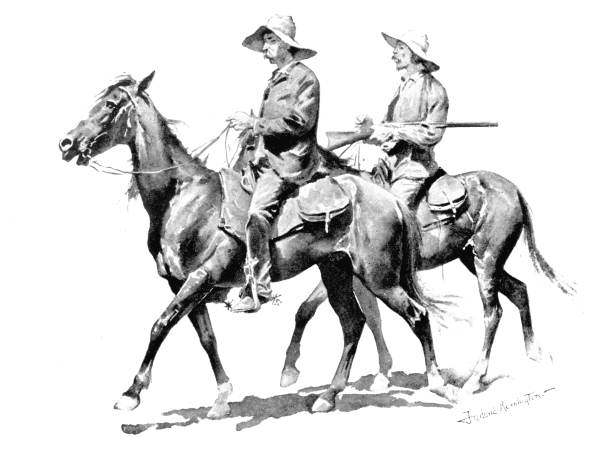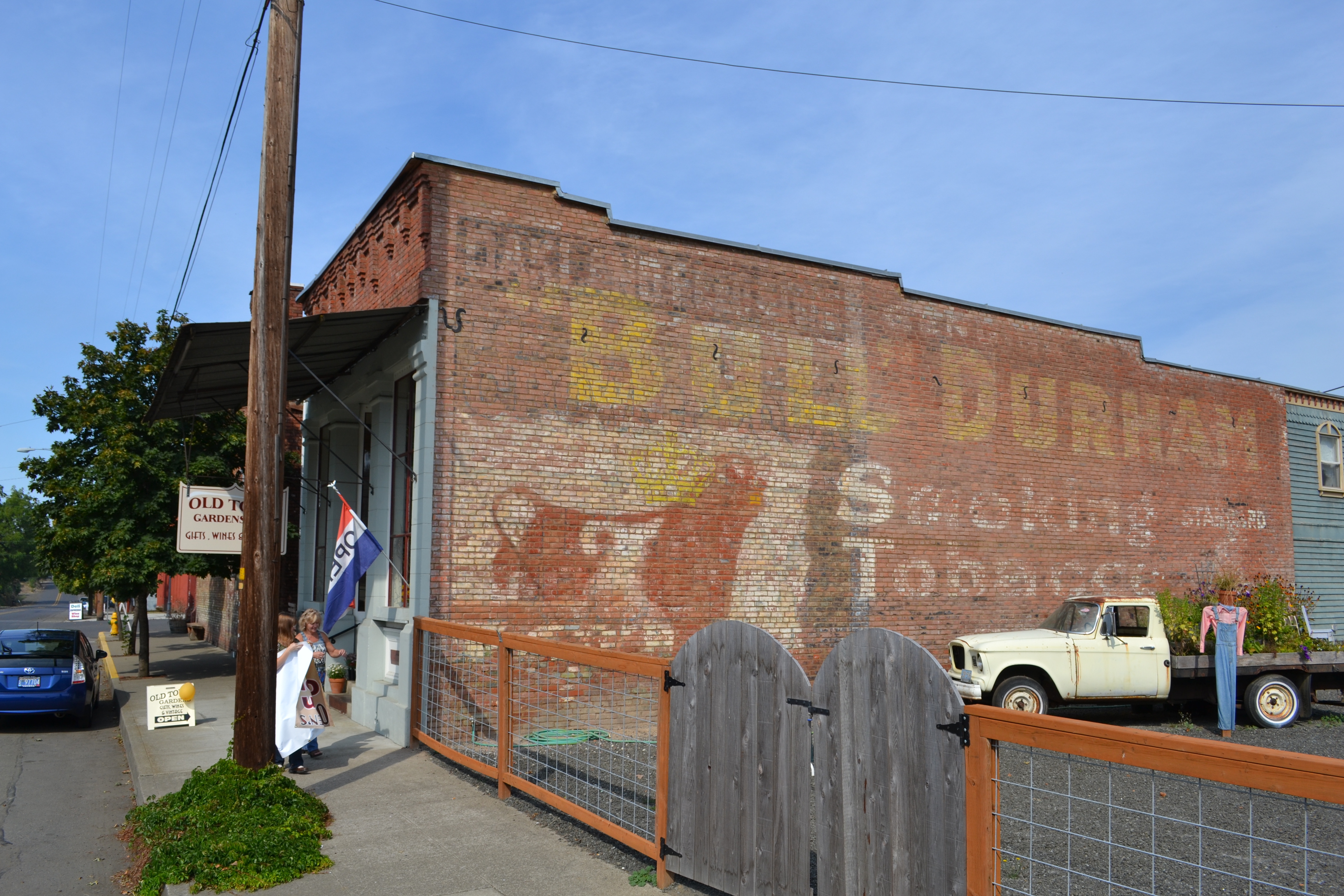
There were two families that were particular friends of our
family besides Uncle Andy and Aunt Ellen and the boys. The Connells, who lived
in the Central Cove area about ten miles northwest of our place. These people
were the parents of Pearl Stocker and so were Mack Stocker’s in-laws. The
Connells had three other children – Roy, Ellis and Cleo. Both Roy and Ellis
were in the late teen-age group. Cleo is about three years older than I am.
Colonel and I always liked to visit the Connells because they gave us the run of
the place. Their house had a wide veranda all the way around and a lot of shade
trees, so it was almost like a picnic. They had a lot of horses which we were
allowed to ride. Both Roy and Ellis had worked as cowboys on their Pendleton ranch,
so they had all the trappings, including saddles, ropes, sheepskin chaps and
guns. So, these two could keep two little boys entertained all day. Roy
considered himself quite a rider, but managed to get himself dumped every time
he got on a bucker. Our usual stay at their place was one day. Roy and Ellis
had a couple of greyhound-type dogs that Colonel and I admired. One time on our
way home, these dogs followed us. About five miles from our house I spotted a
coyote standing along side of the road. (That guy sure liked to live
dangerously.) Colonel and I both started to yell for the dogs. They came and
they went after that coyote. We watched them for a long way, since the country
is flat, but we never did find out if they caught up with the coyote. (Maybe
I’ll have more about Roy later.)
The William Weicks were also special friends of the family.
They were from Germany, so had heavy German accents. They had three children,
two girls and a boy, Walter, who had drowned in an irrigation ditch. These
people had taken their loss pretty hard, as did our parents on the death of
Mildred. Perhaps that is why they were close friends. We didn’t visit them too
often since it was a good two-day trip. Colonel and I liked to visit them
mainly, I think, because of the food. Mrs. Weick really knew how to cook
German-style food. We also got to sleep in feather beds, which we liked very
much. I’ll never be able to describe to you the pleasure of sleeping in such a
bed, especially after a hard day of traveling.
 |
| 1910 Census: Caldwell Ward 1, Canyon County, Idaho |
Bill Weick had served his term in the German army and apparently was not happy about the experience, but he seemed to retain a lot of love for Kaiser Wilhelm; and as the war in Europe continued and got closer to us, Bill couldn’t contain himself and spoke out vehemently in favor of Germany. That was the wrong thing to do and it wasn’t but a short time and Weick family was bound for Nebraska where they ended their years in semi-isolation.
Mack and Roy
I told you above that Mack Stocker didn’t want anything to
do with his daughter, Vivian. Mama took care of the baby for about two months.
Finally, Mack decided it wasn’t the baby’s fault, so he made a deal with his mother-in-law,
Mrs. Connell, to take care of Vivian. That relieved Mama of a lot of work.
Mack wouldn’t stay in the house where Pearl had died, so
decided to tear it down and rebuild it about 200’ closer to the river on a
little knoll. To help him in this endeavor, he got Roy Connell. While this work
was in progress, they lived in a tent close to the river and near the horse
corrals. Colonel and I liked to visit them and eat in the tent. Of course, we
both cared very much for both men, as they told us stories of cattle, horses,
cowboys and Indians. One time, Roy tore the seat out of his pants. When he came
to our place, he would enter the back door and then sidle around with his back
to the wall to a bench or chair and would repeat the performance upon leaving.
One morning, Mack got up early and fetched Roy’s pants over to Mama to patch
up. There was a flour made that had a large red rooster on the sack. She cut
that portion out of the sack and sewed it into the seat of Roy’s pants. Roy continued
to wear the pants several months in that condition, receiving a lot of kidding.
He wore the pants everywhere since it was the only pair he had.
The Meyers
 |
| via Wikimedia Commons |
Mr. Meyers liked his beer. I guess Mrs. Meyers didn’t like
it, so he hid the supply in the barn. Ray and Homer also liked the stuff, so
they would drink part of a bottle, brew some tea and fill the bottle back up.
Colonel and I both witnessed this covert operation. I could never really
understand how they got away with it. Surely Mr. Meyers could taste the
difference. {James A. Myers, his wife
Mollie and their two sons, Homer and Ray, lived just north of the Aitchison
family.}
Winter sheep
Nearly every winter, Dad allowed a herd of sheep or cattle
to winter over on the place. They were nearly always tended by Basque sheep
herders who lived in a covered wagon, usually near where the sheep bedded down
for the night. When the pasturage ran low, the herders purchased alfalfa hay
from Dad and other local farmers. The last year we ran sheep, an early freeze occurred
and the small potatoes left on the ground after harvest froze. The herd was
driven across this ground and they attempted to eat the potatoes. As you know,
like other kine, sheep swallow their food and later chew a cud. Well, the
potatoes stuck in their throats and choked 15 to 20 to death. Lesson, never
feed a sheep a frozen potato.
From this point on, Dad only ran cattle on the place in the
winter. In this manner, he got rid of a lot of surplus hay as well as some beef
and pork to feed the crews that lived with the cattle. These men were always
housed in a tent. Their bathroom was the great outdoors and a bunch of bawling
cattle to help them sleep. I can’t recall the owner’s name (of the cattle), but
his son was retarded and since Colonel and I had never seen anyone before with
this affliction, we spent a lot of time visiting the tent trying to get the boy
to learn to read, etc. It was, at the time, a mystifying experience. The cowboy
who handled the operation probably had never gone to school either, but he did
know how to handle horses and cattle.
There is one thing that I shall always remember, this may
seem crude, is the smell of a horse barn. I don’t know why I enjoy such an
odor. Maybe it’s a primitive feeling, something from a distant past, but the
smell of horse, harness, hay, and yes, manure, always brings back many memories.
The Bacons
Before I go much farther, I must say something about these
people. As mentioned above, Giles and
Edmund were special friends of Colonel and me, and I could write reams on the things we did, but not on the things we shouldn’t have done. ??!!
Edmund were special friends of Colonel and me, and I could write reams on the things we did, but not on the things we shouldn’t have done. ??!!
Mr. Bacon was a short man and always went around with a
smile on his face. Very quiet, I never heard him raise his voice at anyone or
anything. I think these people had some access to money other than that which
they could derive from their farming activities since they had things we could
dream about, like the best of machinery, wagons, buggies and fancy harness as
well as a bunk house where the hired hands stayed on occasion.
Mrs. Bacon was the matriarch and I’m guessing controlled the
purse strings as well as members of the family to the nth degree. She was great
on giving parties for the children on birthdays, Easter, etc. I remember one
Easter in particular. She had colored up a lot of eggs which we had “found” and
were invited in to partake of the feast. Of course, Colonel and I had been
coached pretty well on table manners, etc., but we were not totally
prepared for the ritual that we experienced. Mrs. Bacon sat at the head of the
table while the rest of us took seats at various places around the table,
Kathleen, the only girl present. We did not talk, only when spoken to by Mrs.
Bacon. She would ask the questions and then we were expected to give our dissertations
in answer. This went on until all those present were allowed to say their
piece. And of course, all the edibles had disappeared, but we all seemed to
like the arrangement since we were asked back many, many times. Robin was not
included in these parties. He must have been quite a bit older than the other
three children and took an interest in and did most of the operation of the
farm. As far as I know, Robin never did attend the local school.
Giles was about my age, although he was a year ahead of me
in school. I believe he’d had some schooling before they moved to the valley. Eddie
was about Colonel’s age and they were in the same grade at school.
_And Kathleen_
I’m going to leave the Bacons here and come back to them
later since there is a lot to write about the boys and our adventures.
{next}
to be continued ...









